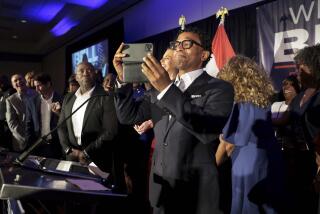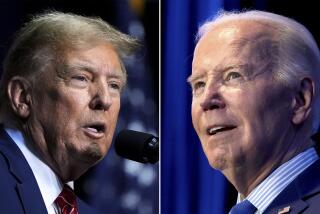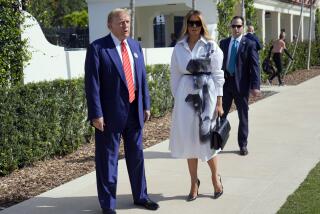Buchanan Staff All but Concedes as Bush Sweeps
- Share via
CHICAGO — President Bush swept to decisive victories in the Illinois and Michigan primaries Tuesday, prompting the disappointed campaign of GOP challenger Patrick J. Buchanan to essentially concede the nomination to the President.
With 83% of the vote counted in Illinois, Bush was leading Buchanan, 76% to 23%. In Michigan, with 83% of the vote, where Buchanan had hoped to ride the rocky economy to a strong showing, Bush led, 67% to 25%. Former Ku Klux Klan leader David Duke had 3% of the vote in Michigan.
In a statement issued from the White House, where he spent Tuesday night, Bush implied that the contentious and sometimes bitter battle between Republicans was over.
“The voters of Michigan and Illinois have endorsed my approach to change in America,” Bush declared. “They have pushed the delegate count to a level where my nomination is virtually assured.”
Buchanan, speaking to supporters in Plymouth, Mich., did not directly acknowledge failure, but he did admit to having been bulldozed by Bush.
“Candor does command us to concede that geography and time were not on our side in the last two weeks, my friends,” the former television commentator said to the cheers of onlookers. “We had to campaign in 10 states, a third of the nation, four of the largest states in the Union, against the President of the United States.
“We are still getting a quarter or a third of the vote against him, and that’s why we’re going to keep on rolling.”
But Buchanan’s campaign manager and sister, Angela (Bay) Buchanan, said that while her brother will contest future primaries, he cannot see his way to victory.
“We have to realize that the nomination is about as far away from us as it can be,” she said. “The party regulars have decided that George Bush is to be the nominee and we have to face that.”
Bay Buchanan said her brother will definitely contest the May 5 North Carolina primary and the June 2 contest in California, where she lives and ran unsuccessfully for the state treasurer’s post in 1990. Under consideration are bids in Wisconsin and Minnesota on April 7, and Pennsylvania three weeks later, she said.
She also signaled that Buchanan will mute his scalding criticisms of Bush in the coming weeks, in recognition of Republican fears that his continued presence will hurt the President’s chances in the fall.
“Pat is going to support the nominee and doesn’t want to do anything to hurt the nominee,” she said. “We will focus on the issues and where the party should be going, as opposed to what George Bush might or might not have done. You will see us turn the corner and talk about the future.”
Buchanan said her brother will not suspend his campaign.
“There are certain principles that we feel have been abandoned,” she said. “And they (voters in later primaries) have just as much right as those who have already voted to make that statement as well.”
In his post-primary statement, Bush was doing his best to shift into general election mode by calling on congressional Democrats, one of his favorite targets, to pass his economic proposals by Friday. That was the date he imposed in his State of the Union address.
Voters on Tuesday “added their voices to the nation’s call for congressional action on our plan to get this economy moving,” the President said.
Earlier in the day, after he returned from Arkansas where he awarded the Medal of Freedom to Wal-Mart founder Sam Walton, Bush said he felt good about his chances for election.
“What I’ve got to do is lead this country, and then in the meantime take care of these primaries that crop up every Tuesday,” he added, adopting the more presidential approach he has favored in recent days.
According to exit polls conducted by the Los Angeles Times, Bush’s optimism was rooted in political reality. In both primaries, the President won the votes even of those who said they believe the nation is on the wrong track.
That was the most striking change from earlier primaries, such as New Hampshire and Georgia, where Buchanan successfully appealed to the economically disaffected in his quest for votes.
Also, fewer people in Michigan and Illinois described the country as heading the wrong way than had made that determination earlier in the political primaries. It was not clear whether that was simply because of the makeup of the Republican electorate in the states or part of a consensus that the country’s condition is changing.
Tuesday’s results guarantee Bush the lion’s share of the 157 delegates awarded--85 in Illinois and 72 in Michigan--and will push him enticingly close to the 1,105 needed for nomination.
Bush technically had earned 560 delegates by Tuesday, but his delegate-counters suggested that when party leaders are counted the real total is hundreds higher.
To be nominated at the GOP’s August convention, Buchanan would have to win majorities in at least five states. He has yet to win any of the 17 primaries held thus far, and is not on the ballot for the April 7 New York contest, where 100 delegates are at stake.
Buchanan’s campaign manager said that she considers it unlikely that he will win future contests, a problem she ascribed to Republican loyalty to the sitting President.
“They feel that he is the incumbent, he is the President and they just aren’t prepared to walk away from it,” she said.
As Tuesday’s twin primaries approached, Bush was utterly confident and his challenger was clearly struggling.
On Tuesday, in Dearborn, Buchanan was kicked out of a polling place, which he had entered not knowing that his presence there was illegal.
Buchanan said later that while his campaign evolved into a competent guerrilla operation in New Hampshire and in Georgia, two earlier states where he could concentrate his efforts, he had not been effective in Michigan and Illinois.
“I think (the campaign) probably should have spent more time on radio and television and more time in vote-rich areas, more time with the Reagan Democrats,” he said, referring to conservative Democrats who have swung over to the GOP in the last three presidential elections.
Going into the Michigan primary in particular, Buchanan and his supporters had been hopeful that the state’s economic woes would make it fertile ground for him. But that did not materialize.
Times staff writer James Gerstenzang contributed to this story from Washington.
More to Read
Get the L.A. Times Politics newsletter
Deeply reported insights into legislation, politics and policy from Sacramento, Washington and beyond. In your inbox twice per week.
You may occasionally receive promotional content from the Los Angeles Times.











